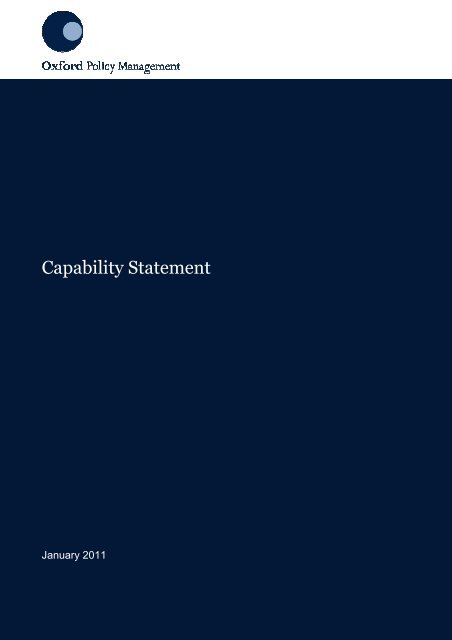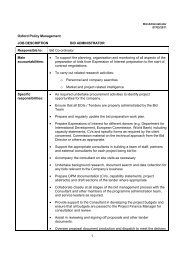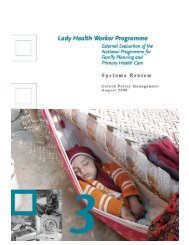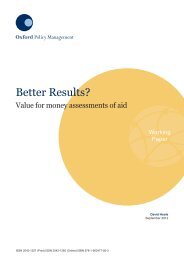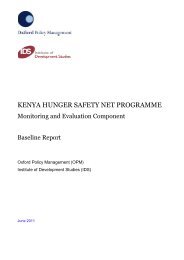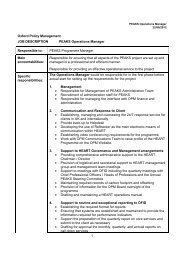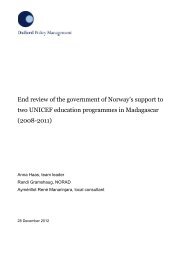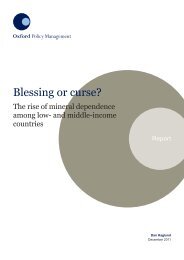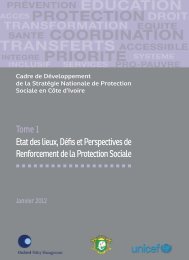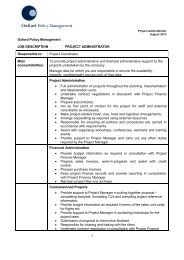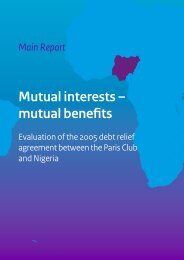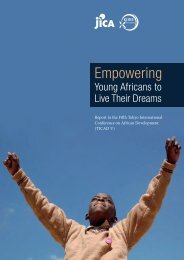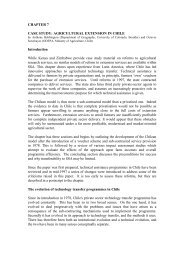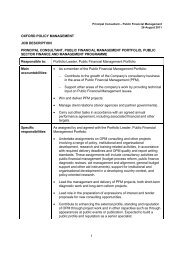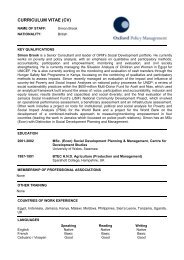OPM Capability Statement - Oxford Policy Management
OPM Capability Statement - Oxford Policy Management
OPM Capability Statement - Oxford Policy Management
Create successful ePaper yourself
Turn your PDF publications into a flip-book with our unique Google optimized e-Paper software.
<strong>Capability</strong> <strong>Statement</strong><br />
January 2011
Table of contents<br />
<strong>OPM</strong> Capacity <strong>Statement</strong> 3<br />
Introducing <strong>OPM</strong> 3<br />
The <strong>OPM</strong> structure 4<br />
<strong>OPM</strong> Country Offices 6<br />
Contact <strong>Oxford</strong> <strong>Policy</strong> <strong>Management</strong> 9<br />
<strong>Oxford</strong> Office<br />
Error! Bookmark not defined.<br />
India Office<br />
Error! Bookmark not defined.<br />
Pakistan Office<br />
Error! Bookmark not defined.<br />
South Africa Office 9
<strong>OPM</strong> <strong>Capability</strong> <strong>Statement</strong><br />
<strong>OPM</strong> <strong>Capability</strong> <strong>Statement</strong><br />
Introducing <strong>OPM</strong><br />
<strong>OPM</strong> is an international development consultancy that enables strategic decisionmakers<br />
to identify and implement sustainable solutions for reducing social and<br />
economic disadvantage. Our success is based on a unique combination of high-quality<br />
analysis and 30 years’ practical experience of facilitating positive change in over 80<br />
countries across the globe. Supported by a multinational team of 100 full-time<br />
specialists on three continents, our expertise spans the entire policy cycle, from<br />
diagnosing the issues and strategic options through to implementation and evaluation.<br />
<strong>OPM</strong> aims to contribute in innovative ways to enhance economic and social progress in<br />
developing and transition economies, with a focus on the needs of the socially and<br />
economically disadvantaged. <strong>OPM</strong> work focuses on:<br />
• improving access to, and efficiency and effectiveness of, key social sector services,<br />
including health, education and social protection;<br />
• strengthening the use of quantitative and qualitative information in formulating,<br />
monitoring and evaluating policies and programmes and enhancing accountability;<br />
• more effective and accountable public expenditure management;<br />
• more effective macroeconomic management, private and financial sector policies<br />
and programmes;<br />
• public administration and governance reform; and<br />
• capacity building and training tailored to the specific needs of the clients.<br />
Through policy research and development, strategic advice and management capacity,<br />
<strong>OPM</strong> is able to link strategic vision to best operational practice. <strong>OPM</strong> has a worldwide<br />
reputation for combining analytical rigour with practical know-how. This enables<br />
collaboration on client engagements with many of the leading names in policy<br />
development and the management of change, including global consultancy practices,<br />
universities and major financial institutions.<br />
<strong>OPM</strong> is a dynamic organisation that has grown robustly over recent years while<br />
maintaining its key strengths within its specialist consulting practices. <strong>OPM</strong>’s culture<br />
and management structure support excellent interaction across disciplines: social,<br />
economic, organisational and administrative issues typically require coordinated expert<br />
analysis for effective policy advice and the delivery of superior results. This core<br />
competence in professional cross-fertilisation is highly valued by clients.<br />
<strong>OPM</strong> clients need expert advice and assistance to provide a firm foundation for<br />
making policy and strategy decisions and managing operations. <strong>OPM</strong> helps clients<br />
across the whole spectrum of their requirements, from supporting policy development<br />
to the management of associated change. <strong>OPM</strong> has worked in over 90 countries with a<br />
wide range of clients in Africa, Europe, the Commonwealth of Independent States (CIS)<br />
and transition countries, throughout Asia and the Middle East, and in central and<br />
southern America.<br />
<strong>OPM</strong> people. An important feature of <strong>OPM</strong> is its strong core of technical staff,<br />
employing over 70 full-time consulting staff and regularly drawing on the experience of<br />
a carefully chosen group of specialist associates. Based in <strong>Oxford</strong>, <strong>OPM</strong> has country<br />
offices in India, Pakistan and South Africa, providing access and support to a much<br />
January 2011 3
<strong>OPM</strong> <strong>Capability</strong> <strong>Statement</strong><br />
larger network of organisations and independent consultants across the globe for<br />
specific project needs. <strong>OPM</strong> consultants are respected in their fields, with a reputation<br />
for combining intellectual leadership with the ability to develop practical solutions.<br />
The <strong>OPM</strong> structure<br />
<strong>OPM</strong>'s consultants are grouped into four areas of expertise. These are the social policy<br />
programme; the statistics, evaluation and accountability programme; the public sector<br />
finance and management programme; and the economic policy programme.<br />
(1) Social <strong>Policy</strong><br />
• The poverty policy and social protection team specialises in poverty<br />
measurement and analysis; options, strategies and institutional arrangements for<br />
social protection; monitoring and evaluation of social protection programmes and<br />
poverty reduction strategies; and financing poverty reduction programmes. The<br />
team is also skilled in supporting the development of social care services, including<br />
for children. <strong>OPM</strong> has particular expertise in combining quantitative and qualitative<br />
methods to measure and explain the impacts of interventions on different groups of<br />
people, capturing multiple dimensions of poverty and identifying effective policy<br />
solutions.<br />
• <strong>OPM</strong>’s health and education policy teams focus on the analysis of policy options;<br />
financing strategies; reform and organisational change; pro-poor service delivery;<br />
and the evaluation of health care and education delivery.<br />
(2) Statistics, Evaluation and Accountability<br />
• <strong>OPM</strong> has expertise in surveys and statistics for evidence-based policy-making, in<br />
the design and implementation of national household and community surveys, and<br />
public expenditure tracking and service delivery surveys. It includes the<br />
development of monitoring and evaluation systems and the design and<br />
implementation of rigorous impact evaluations. <strong>OPM</strong> provides support in the<br />
development and reform of national statistical systems, in developing statistical<br />
management capacity, and capacity development in a range of social and<br />
economic statistics. Statistical products are developed to support policy-making and<br />
accountability.<br />
• <strong>OPM</strong> supports cross-cutting social development, promoting policies and<br />
institutions that increase inclusiveness and equity in access to and control of<br />
services, resources and opportunities. Operationally this includes integrating<br />
poverty and policy analysis with the process of engaging citizens and service users,<br />
particularly the poor and marginalised groups. Social development also involves<br />
increasing participatory governance of policy processes by strengthening social<br />
accountability mechanisms in public policy design; budget allocation;<br />
implementation; and monitoring and evaluation.<br />
• <strong>OPM</strong> carries out a wide range of evaluations and programme reviews, including<br />
operational, process and impact evaluations, for bilateral and multilateral agencies<br />
and for governments. We conduct independent, rigorous and evidence-based<br />
evaluations that reflect the Paris Declaration principles of country ownership and<br />
harmonisation and that are in keeping with the OECD-DAC evaluation criteria and<br />
draft evaluation quality guidelines. Evaluation approaches used have included<br />
econometric studies; large-scale surveys; use of participatory techniques;<br />
document reviews; and consultation with key informants.<br />
January 2011 4
<strong>OPM</strong> <strong>Capability</strong> <strong>Statement</strong><br />
(3) Public Sector Finance and <strong>Management</strong><br />
• <strong>OPM</strong>’s approach to public financial management (PFM) is based on an<br />
understanding of the institutional and organisational requirements of a functioning<br />
public sector budget process and financial management and reporting system.<br />
<strong>OPM</strong> is at the forefront of developments in PFM with a strong track record of<br />
research, operational experience and evaluation work in a wide range of<br />
assignments, including budget process reforms and medium-term expenditure<br />
frameworks (MTEFs); macroeconomic and fiscal forecasting; public expenditure<br />
reviews; public finance diagnostics; and budget support, training and dissemination.<br />
• Public management and accountability embraces a wide range of issues<br />
concerned with public administration reform and modernising the management of<br />
public services, including performance management systems; human resource<br />
management; organisational development and the strengthening of policy<br />
processes; and other aspects of governance and accountability.<br />
• <strong>OPM</strong>’s debt management work includes debt strategy and policy formulation; the<br />
legal and institutional structure for debt management; debt sustainability analysis<br />
and other cost / risk analytical frameworks; support for debt restructuring and debt<br />
relief; and management of contingent liabilities, on-lending and subnational debt.<br />
• <strong>OPM</strong> regional development and local government expertise addresses the role<br />
of the lower levels of government and local communities in policy planning and<br />
resource allocation. The work includes: regional / local economic development<br />
strategies; institutional linkages between local service delivery institutions, local<br />
authorities, and local communities; local government reforms; fiscal decentralisation<br />
and financing of local authorities and other local service delivery institutions; local<br />
participatory planning processes; and decentralised systems of poverty monitoring.<br />
(4) Economic <strong>Policy</strong><br />
• Development policy specialities include support for national poverty reduction<br />
programmes; development agency strategies; aid evaluation and policy research;<br />
and advice to the private sector on international development issues.<br />
• <strong>OPM</strong>’s macroeconomic policy expertise includes economic assessment of<br />
alternative policy options; development of macroeconomic forecasting models and<br />
financial programming frameworks; and the estimation of fiscal space under<br />
different economic scenarios.<br />
• Private sector policy focuses on supporting the development, implementation and<br />
review of private sector development strategies, including the analysis of poverty<br />
and market linkages and the development of micro-, small and medium enterprises.<br />
• Financial sector development, with a focus on financial sector policies, comprises<br />
the design and implementation of integrated financial sector reform programmes,<br />
and the coordination and implementation of financial sector assessment<br />
programmes.<br />
• <strong>OPM</strong> rural and natural resource policy work comprises natural resource<br />
management; the mainstreaming of environment and rural development issues into<br />
poverty reduction strategies; and the design and management of complex<br />
organisational and policy reform programmes affecting the rural sector. This has<br />
included providing advice to corporate and government clients, as well as to<br />
multilateral agencies, on how the benefits from extracting natural resources can be<br />
maximised for social advantage and for sustainable development outcomes.<br />
January 2011 5
<strong>OPM</strong> <strong>Capability</strong> <strong>Statement</strong><br />
<strong>OPM</strong> Country Offices<br />
To best serve our clients, <strong>OPM</strong> has branch offices in countries where we traditionally<br />
operate and in countries where significant market opportunities are present as a result<br />
of government demand for support with policy development and implementation. These<br />
country offices extend and improve our services in regions where we have<br />
considerable experience, contribute to building national capacity, and strengthen the<br />
contact and support that we offer to local clients.<br />
<strong>OPM</strong> has country offices in India (New Delhi), Pakistan (Islamabad) and South Africa<br />
(Tshwane – Pretoria).<br />
<strong>OPM</strong> New Delhi<br />
<strong>OPM</strong> India compliments and strengthens the company’s global experience, cutting<br />
edge quality control and technical expertise across sectors, effectively tapping into and<br />
collaborating with a widening range of local organisations and established networks.<br />
<strong>OPM</strong> Work in India<br />
Our current projects in India are carried out with the support of well-established,<br />
credible, and experienced local partners and consultants, with strategic technical inputs<br />
from across <strong>OPM</strong>.<br />
In early 2009 <strong>OPM</strong> India won two interrelated UNICEF projects on child labour and<br />
children’s rights.<br />
• A formative research study using participatory research methods in four states that<br />
will increase understanding of knowledge, attitudes, and practices around child<br />
labour in India, particularly in the cotton sector, contributing to UNICEF’s<br />
communication strategies to reduce child labour. This is being implemented with<br />
local partner organisations: Tata Institute of Social Sciences (TISS), Glocal<br />
Research & Consultancy Services, and Child Rights Trust (CRT).<br />
• A desk review of children in the cotton sector in India, specifically in five states, that<br />
will be informed by the ‘knowledge, attitudes and practices’ (KAP) study and<br />
contribute to an understanding of current policies and their implementation<br />
processes, the existing legal frameworks, and programmes and schemes related to<br />
child labour. Our partners on this project are the Tata Institute of Social Sciences<br />
(TISS), Child Rights Trust (CRT), Dr Davuluri Venkateswarlu (Director of Glocal<br />
Research), and Sudhir Katiyar (Director of Prayas Center for Labour Research &<br />
Action).<br />
In addition at the end of 2009, we completed work on the formulation of a capacity<br />
development framework for use by UNICEF-India within the scope of their Country<br />
Programme of Action 2008-12. This framework tool will assist UNICEF-India offices<br />
and staff to self-assess their capacity development efforts in six key flagship<br />
programmes.<br />
We are currently working on:<br />
• Developing an M&E framework for district decentralisation and convergence<br />
intervention: Phase I (Baseline Study). This study is being carried out in<br />
collaboration with the India Development Foundation (IDF).<br />
January 2011 6
<strong>OPM</strong> <strong>Capability</strong> <strong>Statement</strong><br />
And within the South Asia region, in October 2009 we were contracted for a<br />
quantitative and qualitative baseline study in Nepal for UNFPA’s Sixth Country<br />
Programme 2008–10. This will be implemented in collaboration with a well-established<br />
local NGO in Nepal, The Center for Research on Environment, Health and Population<br />
Activities (CREHPA).<br />
<strong>OPM</strong> Islamabad<br />
Building on our past history and deep involvement in Pakistan, in January 2008 we<br />
opened an <strong>OPM</strong> office in Islamabad. It has six full time experienced consultants in the<br />
Pakistan Office, mostly with international experience, who are involved in various <strong>OPM</strong><br />
assignments in Pakistan and who work closely with their international counterparts.<br />
<strong>OPM</strong> Islamabad also regularly draws on the experience of a carefully chosen group of<br />
specialist associates.<br />
<strong>OPM</strong> Work in Pakistan<br />
<strong>OPM</strong> has shown its proficiency in different sectors of Pakistan including health,<br />
education, social protection, poverty, microfinance, and the rural and urban economy<br />
for over a decade and is respected for its quality of work. <strong>OPM</strong> has been involved in<br />
high standard qualitative and quantitative national surveys, monitoring and evaluation,<br />
and research in social and economic sectors. A few examples include:<br />
• Pakistan Integrated Household Survey (1995–2003)<br />
• Evaluation of the Prime Minister's Lady Health Worker Programme (1999–2003)<br />
• Social Action Programme Mid Term Review in Pakistan (2000)<br />
• Pakistan Participatory Poverty Assessment (2000–2003)<br />
• Health Sector Reform. North West Frontier Province, Pakistan (2001–2002)<br />
• Costing of the PSRP Education Strategy (2003)<br />
• Development of a Strategic Plan for Aga Khan Health Service, Pakistan (2004)<br />
• Quantifying Social Exclusion in Pakistan (2004)<br />
• Review of DFID Pakistan Trade and Poverty Programme<br />
• Government of Pakistan Trade Institutional Review<br />
• Poverty and Social Impact Assessment of Microfinance policies in Pakistan (2005–<br />
2006)<br />
• Pakistan Country Programme evaluation (2005–2007)<br />
• Review of the Fiduciary Risk Assessment of the Maternal and Newborn Health<br />
Programme in Pakistan (2007)<br />
• Review of the Fiduciary Risk Assessment of the Earthquake Reconstruction and<br />
Rehabilitation Authority (ERRA) and its Affiliates, Pakistan (2008)<br />
• Lady Health Worker Programme Fourth External Evaluation (2007–2009)<br />
• Costing Analysis of NWFP Education Sector.<br />
<strong>OPM</strong> is presently providing technical expertise in the following projects in Pakistan:<br />
• NWFP Provincial Reform Programme and Capacity Building Support to Federally<br />
Administered Tribal Areas (FATA) Secretariat<br />
• Multi Indicator Cluster Survey (MICS) in NWFP<br />
• Mid Term Budget Frame work Pakistan Project<br />
January 2011 7
<strong>OPM</strong> <strong>Capability</strong> <strong>Statement</strong><br />
• Punjab – Reform of the Provincial Economic Research Institute (PERI) and the<br />
Punjab Bureau of Statistics<br />
• Framework for Independent Health Care Commission in Punjab.<br />
<strong>OPM</strong> Pretoria<br />
<strong>OPM</strong> believe that the commitment to and drive for socioeconomic rights and<br />
development in the Southern Africa region will continue to demand a range of expert<br />
inputs and that <strong>OPM</strong> with its deep sectoral knowledge and experience and capacity<br />
across the policy cycle (from problem identification and diagnostics to policy<br />
development, policy implementation and monitoring and review) can effectively<br />
complement the approaches and substantial skills already in place in South and<br />
Southern Africa.<br />
<strong>OPM</strong> Work in Southern Africa<br />
In its initial phase the SA office provided support to social policy projects in Moldova<br />
and Zambia and a large education reform project in Nigeria (ESSPIN). The office was<br />
involved in a mid-term evaluation of the DFID funded Strengthening Analytical Capacity<br />
for Evidence Based Decision Making Programme, implemented by the South African<br />
Government.<br />
The SA office is supporting <strong>OPM</strong>’s advising of the National Treasury on options for<br />
hospital funding and is participating in a mid-term review of the implementation of the<br />
SA National Strategic Plan for HIV & AIDS, led by Health and Development Africa.<br />
<strong>OPM</strong> is a member of a consortium, led by the Economic <strong>Policy</strong> Research Institute,<br />
undertaking an impact evaluation of the Child Support Grant for the Department of<br />
Social Development.<br />
Other recent and current <strong>OPM</strong> projects in the Southern African region include:<br />
• Work on financial inclusion in a number of countries and for a range of clients,<br />
including FinMark Trust;<br />
• Ongoing support to the Zimbabwe Ministry of Finance with budgeting and budget;<br />
• A Health Public Expenditure Review in Lesotho;<br />
• Work on sustainable financing for AIDS in Swaziland, Lesotho and;<br />
• Work on statistics for the Mozambican; and<br />
• Implementation of the Financial <strong>Management</strong> Improvement Programme to the<br />
South Africa National Treasury, funded by the EC.<br />
January 2011 8
<strong>OPM</strong> <strong>Capability</strong> <strong>Statement</strong><br />
Contact Us<br />
Africa<br />
<strong>OPM</strong> Pretoria<br />
Unit 5 Parkland Building, 223 Bronkhorst Street<br />
Brooklyn, Pretoria 0102, South Africa<br />
T +27 (0)12 346 0692<br />
E info.southafricaoffice@opml.co.uk<br />
Asia<br />
<strong>OPM</strong> New Delhi<br />
J-25 Jor Bagh Lane<br />
New Delhi 110003, India<br />
T +91 (0)11 2464 6026<br />
E info.indiaoffice@opml.co.uk<br />
<strong>OPM</strong> Islamabad<br />
96 Margalla Road, Sector F-8/2<br />
Islamabad, Pakistan<br />
T +92 (0)51 2853 980<br />
E info.pakistanoffice@opml.co.uk<br />
<strong>OPM</strong> Dhaka<br />
Level 5, Chandiwala Mansion, House 32<br />
Road 11, Banani, Dhaka 1213, Bangladesh<br />
T +88 (0)1764 366 766<br />
E info.bangladeshoffice@opml.co.uk<br />
<strong>OPM</strong>L Jakarta<br />
City Lofts, 9 th Floor, Suite 916<br />
Jalan KH Mas Mansyur No.121<br />
Jakarta 10220, Indonesia<br />
T +62 (0)21 2555 6753<br />
E info.indonesiaoffice@opml.co.uk<br />
Europe<br />
<strong>OPM</strong> <strong>Oxford</strong><br />
6 St Aldates Courtyard, 38 St Aldates<br />
<strong>Oxford</strong>, OX1 1BN<br />
United Kingdom<br />
T +44 (0)1865 207 300<br />
E admin@opml.co.uk<br />
www.opml.co.uk<br />
January 2011 9


